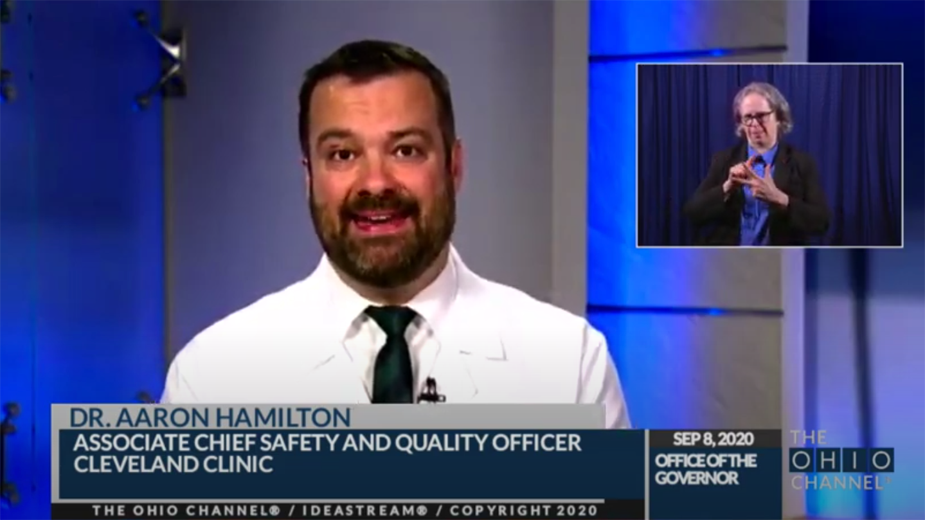Cleveland Clinic Releases Guide to Help Make Safe Decisions during Pandemic
YOUNGSTOWN, Ohio – A new guide developed by the Cleveland Clinic and Clorox is aimed at helping families make decisions about the safety of activities and what precautions ought to be taken.
At Gov. Mike DeWine’s briefing Tuesday, Dr. Aaron Hamilton, the health-care system’s associate chief safety and quality officer, said the guide looks at three primary areas: time, space and people.
“The time part is about how much time you’ll spend at an activity and, in that same dimension, how frequently you’ll be doing that. Is this an indoor activity or an outdoor activity? Is there the ability to socially distance?” he said. “We don’t think about it a lot, but I urge people to consider how well they know the people they’ll be interacting with and how well you know they’re adhering to the guidelines we’ve put out there.”
The guide can be read HERE. With the return of students to schools, the consideration of safety precautions is as important as ever, Hamilton said.
“This is a space from a time perspective that you’ll be going and spending multiple hours if it’s in-person. It’s an indoor activity, but schools are working to get space and create appropriate physical distancing,” he said. “And finally, there’s people. We know teachers are doing everything they can to make their rooms safe and hopefully our friends and colleagues are doing everything they can.”
On the same topic, DeWine addressed concerns over college students going home for Thanksgiving break, potentially bringing the coronavirus back with them. About two weeks since students returned to campus, some schools have reported a surge in cases, which has caused concern among local health districts.
“This morning, I talked with all 14 university presidents in our four-year system and they all understand that. The question we’ll have to face is, ‘What about Thanksgiving?’ I think that’ll take some real thought,” he said. “There are some schools that have made the decision to close at Thanksgiving and not come back until January. It raises the question of whenever they leave college and, if the rate is high [at home] what precautions there are.”
The answer, he said, will likely depend on testing capabilities at the time and if students will be able to get tested before they return home.
With the uptick in cases, DeWine noted that there hasn’t been a corresponding surge in hospitalizations among college students.
“One of the concerns is a ping pong ball effect where someone who’s 18 gets infected, goes home and infects someone else,” he said. “There’s concern from health departments that universities with a high number of students coming down with it and leading to spread into the community. To my knowledge, we’ve not seen much of that yet.”
The governor also took time to address a “crazy, ridiculous internet rumor” that the renewal of Ohio’s noncongregate housing funding from the Federal Emergency Management Agency is responsible for the forcible separation of families for quarantine and relocation to camps run by the agency.
“This order does not create FEMA camps to force anyone to quarantine against their will, as has been reported on the internet,” he said. “It is not true. There is no intention anyone has to separate children.”
The funding for noncongregate housing was authorized by the state’s initial emergency declaration in March and renewed again at the end of April before a second renewal Aug. 31, at which point the conspiracy theory began circulating.
Money from the federal agency is being used to pay for stays in places like hotels when it is not possible for those who have had potential exposure to quarantine safely at home. In an example, DeWine suggested a case where a hospital worker has someone living with them who has a compromised immune system, causing that worker to stay somewhere else during their two-week quarantine period. In Ohio, the funding has been used in a few cases, but not in any widespread manner.
“The bottom line: neither FEMA nor [the Ohio Department of Health] are going to set up ‘FEMA camps’ for anyone to quarantine against their will,” he said. “What we are doing is making available a safe place for people to stay when they have loved ones they are trying to protect and they have no other place to go.”
During his portion of the briefing, Lt. Gov. Jon Husted announced the Ohio Bureau of Motor Vehicles received an award from the American Association of Motor Vehicle Administrators for the implementation of the Get in Line Online program, which allows those who need to use the agency’s service to schedule appointments ahead of time, reducing the length of lines and time spent in the offices.
Copyright 2024 The Business Journal, Youngstown, Ohio.



